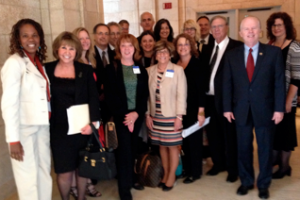I decided to do a little online research to find out what other people thought were good” divorce movies. After, I realized that not only were many of the movies new to me, one of my favorites, Bye Bye Love, wasn’t on most of the lists.
What makes a good or bad divorce movie? In my opinion, a good divorce movie has a message or opens our eyes in some way, shape or form – or maybe helps a child or adult in a real way.
The first movie on my list to watch was Shoot the Moon, a 1981 drama starring Albert Finney and Diane Keaton. Shortly into the movie I realized why most people watch divorce comedies rather than dramas. Let me tell you divorce dramas can be really depressing. That being said, Shoot the Moon is a top-of-the line divorce movie.
Spoiler Alert: Shoot the Moon would likely cause a divorced or divorcing individual to relive some raw emotions which may lead to an Aha! moment.
I’ll try not to spoil it any more for you. Albert Finney (George) and Diane Keaton (Faith) have been married for years and have four daughters. The movie starts with George, a writer, crying and then calling his girlfriend from the house telephone. The teenaged daughter happens to pick up the phone and hears part of the conversation. That evening, George and Faith attend an award show for George. The next morning they have a huge fight and George moves out.
The three younger daughters deal with the back and forth between the parents and the awkwardness of meeting their father’s girlfriend and their new situation. The teenage daughter, Sherry, wants nothing to do with her father. We know what she heard, so we know, on some leve,l that the mother didn’t tell her the nitty gritty and we are pleased that mom does say the right things.
Mom and Sherry have a conversation and then Sherry wants to know why her father left them. Faith responds, “I don’t think he left you; I think he left me.” She didn’t bad mouth George, and she made it clear that the breakdown of the marriage was no one’s fault. We have the watch how the relationship between father and daughter evolves. Personally, I applaud the acting and the writing.
There are times you think that George is moving on with his life along with his girlfriend, Karen Allen, and her son from a prior marriage. Then there are times when we think George isn’t happy in that situation, either.
Faith begins moving on with her life with the guy building her tennis court.
Although, at times, the characters talk about having to be grown-ups, it is apparent that George can’t be that when he sees Faith moving on with her life. I know, that for some, this is a hard concept to grasp:
George had the affair first, so wouldn’t he want Faith to go on with her life? Why is he having regrets?
Well, sometimes people in his situation just do. Marriages are complicated, so is ending a marriage. George is real.
There are some great scenes where George and Faith have some soft moments between themselves, and they each have the opportunity to remember that they were once in love. They each also had the opportunity to acknowledge their counterpart’s good qualities. Of course it made me wonder: What if they had gone to marriage counseling, could this marriage have been saved?
As we watches the characters develop, we see them experience the various stages of grief. We watch them experience denial, anger, depression and some acceptance.
As I tell my clients: No two divorces are the same. Just as people marry for different reasons, people divorce for different reasons, as well. The ending, which is intense and, in some ways, difficult to watch ,allots the viewer decide how this family’s story will unfold and what will be the fate of this marriage. To me, any other ending would have been anticlimactic.
If you want to see an intense or well-acted movie, go see it. If you want a better understanding of divorce from the perspective of the participants, go see it. There is no question in my mind that Shoot the Moon would make a great teaching tool on how to help those going through divorce and to give more insight into their dynamic.
Lorraine Breitman, Esq.



